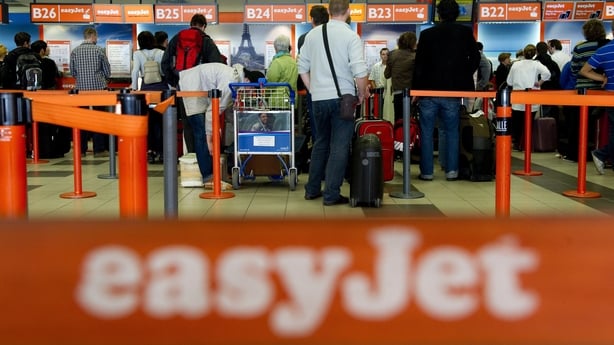EasyJet is looking to fly more passengers in its 2025 financial year, helping the budget airline's shares to hit their highest level in nearly eight months.
The company today forecast a 3% increase in capacity in its next financial year after reporting a strong increase in annual operating profit partly due to a recovery from disruptions arising from the Middle East conflict.
"The airline will continue to grow, particularly on popular longer leisure routes like North Africa and the Canaries and we plan to take 25% more customers away on package holidays," CEO-designate Kenton Jarvis, who is replacing Johan Lundgren next year, said in a statement.
EasyJet shares rose as much as 4.2% in Londo trade to their highest level since early April.
Rival Ryanair earlier this month reported a big drop in after-tax profit in the first half of its financial year and also faced a fall in ticket fares in the summer, although those prices have since normalised.
EasyJet has dodged many of the issues that have plagued the airline industry thanks to its Airbus fleet equipped with CFM engines. It has also avoided the challenges surrounding US plane manufacturer Boeing and engine maker Pratt and Whitney, owned by RTX.
Other European airlines, such as Lufthansa and Air France-KLM, have faced some issues with limited plane deliveries, engine challenges, spiralling labour costs, flattening ticket prices and moderating demand.

EasyJet reported an operating profit of £597m for the year ended September 30, up a quarter from a year earlier but lower than the £625.6m expected by analysts, according to an LSEG-compiled poll.
Outgoing CEO Johan Lundgren said that results were a "significant step towards our goal of sustainably generating over £1 billion annual profit before tax".
The airline has faced slightly higher fuel costs and some disruption from the Middle East, but analysts and investors say lower oil prices and a new network focus could help EasyJet next year.
They are optimistic about the company's ability to meet its expectations for the coming year, with strong demand set to continue and more interest in easyJet's lucrative package holiday business.
"The upcoming winter profitability should meaningfully improve on last year - largely due to EasyJet increasing flying to more distant winter sun destinations, for which customers are willing to pay higher prices," a budget airline investor told Reuters.
For the current fiscal year ending September 2025, EasyJet expects capacity of about 103 million seats and holiday customers to grow by about 25% from last year.

Alex Irving, an analyst at Bernstein, said this strategy could also "possibly be targeting a greater share of 'sun and sand' destinations in the Eastern Mediterranean, following the success of the holidays business that continues to go from strength to strength."
Analysts said lower oil prices will also help to ease EasyJet's cost pressures next year.
EasyJet wants to see Middle East stability before resuming flights to Israel
EasyJet will not rush to resume flights to Tel Aviv after a ceasefire between Israel and Iran-backed group Hezbollah came into effect today, the airline's incoming CEO told reporters.
Airlines around the world suspended flights to Israel and some other locations in the Middle East in the wake of the war in Gaza and the conflict between Israel and Hezbollah spilling into Lebanon.
"I think obviously we would love to fly again to Israel, but we will continue to have a look at the situation," Kenton Jarvis said.
"It's great that ceasefire has been announced, but we'd need to see kind of more stability sustained in the Middle East, before we thought about flying."
Earlier, Emirates Airline President Tim Clark said he was pleased about the ceasefire, adding the airline could go back to flying to Beirut "sooner rather than later".
A Ryanair spokesperson said the airline did not plan on resuming operations to Israel until March 31 at the earliest, and a decision to resume operations to and from Jordan from December was still under discussion.
A number of airlines have shifted their network capacity away from the Middle East to other routes, which could make it difficult to shift it back quickly, even if tensions in the region diminish.

